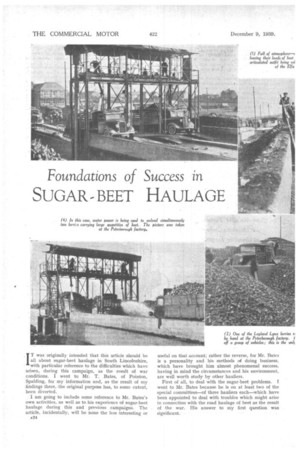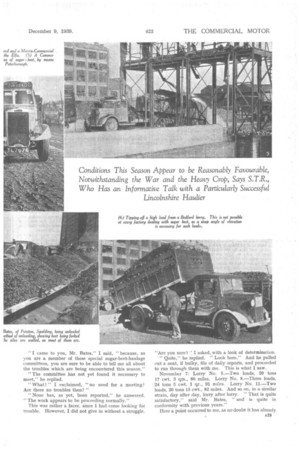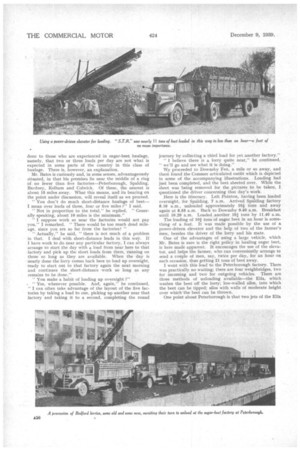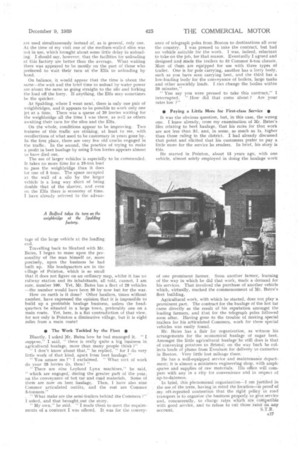Foundations of Success in
Page 26

Page 27

Page 28

Page 29

If you've noticed an error in this article please click here to report it so we can fix it.
SUGAR BEET HAULAGE
IT was originally intended that this article should be all about sugar-beet haulage in South Lincolnshire, with particular reference to.the difficulties which have arisen, during this campaign, as the result of war conditions. I went to Mr. T. Bates, of Pointon, Spalding, for my information and, as the result of my findings there, the original purpose has, to some extent, been diverted.
I am going to include some reference to Mr. Bates's own activities, as well as to his experience of sugar-beet haulage during this and previous campaigns. The article, incidentally, will be none the less interesting or
useful on that account; rather the reverse, for Mr. Bates is a personality and his methods of doing business, which have brought him almost phenomenal success, having in mind the circumstances and his environment, are well worth study by other hauliers.
First of all, to deal with the sugar-beet problems. I went to Mr. Bates because he is on at least two of the special committees—of three hauliers each—which have been appointed to deal with troubles which might arise in connection with the road haulage of beet as the result of the war. His answer to my first question was significant.
" I came to you, Mr. Bates," I said, " because, as you are a member of these special sugar-beet-haulage committees, you are sure to be able to tell me all about the troubles which are being encountered this season."
" The committee has not yet found it necessary to meet," he replied.
" What! " I exclaimed, "no need for a meeting? Are there no troubles then? "
" None has, as yet, been reported," he answered. "The work appears to be proceeding normally."
This was rather a facer, since I had come looking for trouble. However, I did not give in without a struggle.
"Are you sure? I asked, with a look of determination.
"Quite," he replied, "Look here." And he pulled out a neat, if bulky, file of daily reports, and proceeded to run through them with me. This is what I saw.
November 7: Lorry No. 5.—Two loads, 20 tons 17 cwt. 3 qrs., 86 miles. Lorry No. 8.—Three loads, 24 tons 5 cwt. 1 qr., 91 miles. Lorry No. 11.—Two loads, 20 tons 15 cwt., 82 miles. And so on, in a similar strain, day after day, lorry after lorry. " That is quite satisfactory," said Mr. Bates, " and is quite iii conformity with previous years."
Here a point occurred to me, as no doubt it has already A25
done to those who are experienced in sugar-beet haulage, namely, that two or three loads per day are not what is expected in some parts of the country in this class of haulage. There is, however, an explanation.
Mr. Bates is curiously and, in some senses, advantageously situated, in that his premises lie near the middle of a ring of no fewer than five factories—Peterborough, Spalding, Bardney, Kelham and Colwick. Of these, the nearest is about 15 miles away. What this means, and its bearing on the point under discussion, will reveal itself as we proceed.
"You don't do much short-distance haulage of beet-I mean Over leads of three, four or five miles ?" I said.
" Not in proportion to the total," he replied. "Generally speaking, about 10 miles is the minimum."
" I suppose work so near the factories would not pay you," I remarked. " There would be too much dead mileage, since you are so far from the factories? "
" Actually," he said, "there is not much of a problem in that. I deal with short-distance leads in this way. If I have work to do near any particular factory, I can always arrange to start the day with a load from near here to that factory and pick up the short loads from there, running on those so long as they are available. When the day is
• nearly done the lorry comes back here to load up overnight, ready to start out to that factory again the next morning and continues the short-distance work so long as any remains to be done."
" You make a habit of loading up overnight ?"
"Yes, whenever possible. And, again," he continued, " I can often take advantage of the layout of the five factories by taking a load to one, picking up another near that factory and taking it to a second, completing the round journey by collecting a third load for yet another factory." " I believe there is a lorry quite near," he continued, " we'll go and see what it is doing."
We proceeded to Downsby Fen, a mile or so away, and there found the Commer articulated outfit which is depicted in some of the accompanying illustrations. Loading had just been completed, and the beet sheeted over. While the sheet was being removed for the pictures to be taken. I questioned the driver concerning that day's work.
Here is the itinerary. Left Pointon, having been loaded overnight, for Spalding, 7 a.m. Arrived Spalding factory 8.10 a.m., unloaded approximately l0 tons and away again at 8.55 a.m. Back to Downsby 9.40 a.m. Breakfast until 10.20 a.m. Loaded another 101 tons by 11.40 a.m.
The loading of 10i tons of sugar beet in an hour is something of a feat. It was made possible by the use of a power-driven elevator and the help of two of the farmer's men, besides the driver of the lorry and his mate.
One of the advantages of using a large vehicle, which Mr. Bates is sure is the right policy in hauling sugar beet, is here made apparent. It encourages the use of the elevator, and helps the farmer, who can conveniently arrange to send a couple of men, say, twice per day, for an hour on each occasion, thus getting 21 tons of beet away.
I went with this load to the Peterborough factory. There was practically no waiting; there are four weighbridges, two for incoming and two for outgoing vehicles. There are three methods of unloading available—the Ella, which washes the beet off the lorry; low-walled silos, into which the beet can be tipped; silos with walls of moderate height over which'the beet can be thrown.
One point about Peterborough is that two jets of the Elfa
are used simultaneously instead of, as is general, only one. At the time of my visit one of the medium-walled silos was not in rise, which brought about some little delay in unloading. I should say, however, that the facilities for unloading at this factory are better than the average. What waiting there was appeared to be moStly on the part of those who preferred to Wait, their turn atT the Elia to unloading by
hand. . • • On balance, it would appear that the time is about the same—the wait and the brief time to unload hy water power are about the same as going straight to the silo and forking the load off the lorry. If anything, the Elfa may sometimes be the quicker, At Spalding, where I went next, there is only one pair of weighbridges, and it appears to be possible to work only one jet at a time. There was a queue of 20 lorries waiting for the weighbridge all the time I was there, as well as others awaiting their turn for the silos and the Elfa.
On the whole, conditions appear to be improving. Two features of this traffic are striking, at least to me, with recollections of what used to be customary in years gone by. In the first place, there are very few old crocks engaged in the traffic. In the second, the practice of trying to make a profit in beet haulage by using 2-ton lorries appears almost to have died out.
The use of larger vehicles is especially to be commended.
It takes no more time for a 10-ton load to pass the weighbridge than it does for one of 5 tons. The space occupied at the wall of a silo by the larger vehicle is a long way short of being double that of the shorter, and even on the Elfa there is economy of time. I have already referred to the advan tage of the large vehicle at the loading end.
Travelling back to Sleaford with Mr. Bates, I began to muse upon the per sonality of the man himself or, more precisely, upon the business he had built up. His headquarters are in the village of Pointon, which is so small that it does not figure on an ordinary map, whilst it has no railway station and its inhabitants, all told, cannot, I am sure, number 100. Yet, Mr. Bates has a fleet of 28 vehicles —the number would have been 30 by now but for the war.
How on earth is it done? Other hauliers, times without number, have expressed the opinion that it is impossible to build up a profitable haulage business, unless the headquarters be situated in a large town, preferably one on a main route. Yet, here, is a flat contradiction of that view, for not only is Pointon a diminutive village, but it is eight miles from a main route?
• The Work Tackled by the Fleet • Bluntly, I asked Mr. Bates how he had managed it. "I suppose," I said, " there is really quite a big business in agricultural haulage, more than many people think ?"
" I don't know about that," he replied, "for I do very little work of that kind, apart from beet haulage."
• " You amaze me. l"-I exclaimed. " What sort of work do, your 28 lorries do, then?
" There are nine Leyland Lynx machines," he said, "which are engaged; during the greater patt of the year, on the conveyance of hot tat arid road materials. Some of them are now on beet haulage, Then, I have also nine Commer articulated outfits, and the rest are Commer. 5-tonners."
'! What iria.ke are the semi-trailers behind the Commers ?" I asked, and that brought„out the story.
" My own," he said. " I made them to meet the requirements of a contract I was offered. It was for the convey
ance of telegraph poles from Boston to destinations all over the country. I was pressed to take the contract, but had no vehicle suitable for the work. I was, indeed, reluctant to take on the job, for that reason. Eventually I agreed and designed and' made the trailers to fit Comrner 5-ton chassis, Most of them are equipped for use with three types of trailer. One is for pole carrying, another has a lorry body, such as you have seen carrying beet, and the third has a low-loading body for the conveyance of boilers, large tanks and other unwieldy loads, I can change the bodies within 20 minutes."
" You say you were pressed to take this contract," interrupted. " How did that come about ? Are your rates low ?"
• Paying a Little More for First-class Service " • It was the obvious question, but, in this case, the wrong one. I knew already, trona my examination of Mr. Bates's files relating to beet haulage, that his rates for that work are not less than 3d. and, in some, as much as ls. higher than those ruling in the district. I had already discussed that point and elicited that his customers prefer to pay a little more for the service he renders. In brief, his story is this.
He started in Pointon, about 15 years ago, with one vehicle, almost solely employed in doing the haulage work of one prominent farmer. Soon another farmer, learning of the way in which he did that work, made a demand for his services. That involved the purchase of another vehicle which, virtually, marked the commencement of Mr. Bates's fleet building.
Agricultural work, with which he started, does not play a prominent part. The contract for the haulage of the hot tar came directly as the result of his reputation amongst the leading farmers, and that for the telegraph poles followed soon after. Having gone to -the trouble of making special trailers for his, articulated Commers, work fOr these special vehicles was easily found.
Mr. Bates has a flair for organization, as witness his arrangements for the economical haulage of sugar beet. Amongst the little agricultural haulagejle still does is that of conveying potatoes to Bristol; on the way back he collects loads of plums from Evesham for delivery to canneries in Boston. -Very little lost mileage there,' He has a well-equipped service and maintenance department; it is almost a miniature engineering Shop, With ample spares and supplies of raw materials. His office will compare with any in a city for convenience and in respect of ,up-to-dateness. . . • . .
In brief, this phenomenal organization—I am in.stified in the use,of the term, having in mind the location—.is proof of -rny oft-repeated contention that the right policy -in road transport is to organize the business properlyto give service and concurrently, to charge rates which are cdinvatible with good service, and to refuse to cut thOse-rateS on any
account. S.T.R.




















































